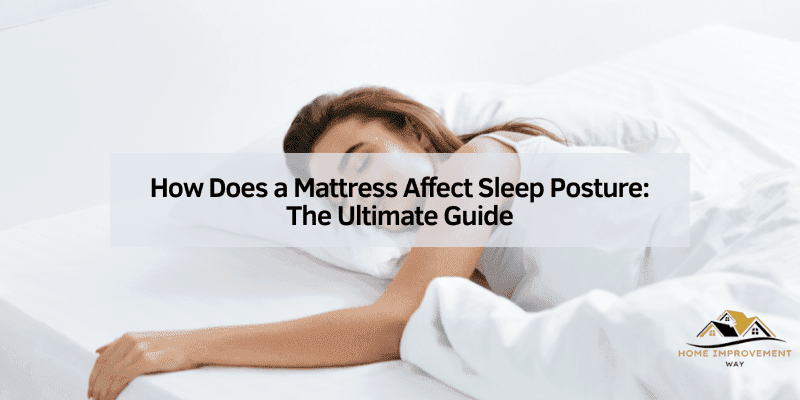How Does a Mattress Affect Sleep Posture: The Ultimate Guide
The mattress impacts sleep posture by providing support and alignment for the body. It affects spinal alignment and distributes weight evenly to prevent discomfort and promote proper sleep posture.
For many people, choosing the right mattress can significantly improve sleep quality and reduce aches and pains. The firmness, material, and overall design of a mattress can influence how the body is positioned during sleep, which can impact comfort and spinal health.
Poor sleep posture, often caused by an unsuitable mattress, can lead to muscle stiffness, back pain, and other discomforts during the day. Therefore, understanding how a mattress affects sleep posture is crucial for maintaining overall wellness and ensuring a good night’s rest.
Choosing The Right Mattress For Better Sleep Posture
Choosing the right mattress for better sleep posture is crucial in ensuring a restful and rejuvenating night’s sleep. The quality and type of mattress you sleep on can significantly impact your sleep posture, affecting your overall health and well-being. Understanding the factors that influence sleep posture and how different mattress features can address these factors is essential in making an informed decision when selecting a mattress.
Importance Of Quality Sleep
Quality sleep is vital for overall health and well-being. It plays a pivotal role in maintaining cognitive function, emotional well-being, and physical health. Poor sleep posture can lead to chronic pain, discomfort, and disrupted sleep, ultimately impacting your daily performance and quality of life. Choosing the right mattress can greatly enhance your sleep posture and contribute to better overall sleep quality.
Factors Affecting Sleep Posture
Several factors can affect sleep posture, including mattress firmness, support, and materials. Understanding these factors can help you make an informed decision when choosing a mattress that best suits your sleep needs.
Mattress Firmness
The firmness of a mattress plays a crucial role in supporting your body and maintaining proper spinal alignment while you sleep. A mattress that is too soft may not provide adequate support, leading to improper posture and discomfort. On the other hand, a mattress that is too firm can create pressure points, causing discomfort and disrupting sleep. It is important to find a mattress with the right level of firmness that offers proper support and comfort for your individual sleep needs.
Mattress Support
Proper support is essential for maintaining healthy sleep posture. A mattress that provides adequate support to the natural curves of your body can help minimize pressure points and promote proper spinal alignment. This can help reduce the risk of developing back pain and discomfort, allowing you to achieve a more restful and comfortable sleep.
Mattress Materials
The materials used in a mattress can impact its overall feel and support. High-quality materials such as memory foam, latex, or hybrid constructions can offer superior comfort and support, promoting better sleep posture. Understanding the different properties of various mattress materials can help you select a mattress that best aligns with your sleep needs and preferences.

Understanding The Impact Of Mattress On Sleep Posture
Alignment Of The Spine
When it comes to maintaining a healthy sleep posture, the alignment of the spine is crucial. A mattress that properly supports the natural curvature of the spine helps in aligning the body and preventing strain on the back, neck, and hips.
Pressure Points Relief
The right mattress can help relieve pressure points by providing cushioning and support where your body needs it the most. By evenly distributing your body weight, a mattress can reduce the buildup of pressure, leading to a more comfortable and restful sleep.
Circulation And Breathing
An optimal mattress promotes healthy circulation and breathing. It allows for proper blood flow and air circulation, preventing numbness and discomfort while sleeping. This contributes to better overall sleep quality and posture support.
Evaluating Different Types Of Mattresses For Sleep Posture
When it comes to achieving good sleep posture, the type of mattress you choose can play a significant role. Different types of mattresses offer varying levels of support and comfort, which can directly impact the alignment of your spine and overall sleep quality. In this article, we will evaluate the different types of mattresses commonly available in the market and how they can influence your sleep posture.
Innerspring Mattresses
Innerspring mattresses are constructed with a network of steel coils that provide support and bounce. These mattresses are known for their durability and good airflow, which can be beneficial for temperature regulation during sleep. However, the level of support they offer may vary depending on the coil count and quality of materials used in the construction.
Memory Foam Mattresses
Memory foam mattresses are designed to contour to the shape of your body, offering personalized support and pressure relief. The material responds to heat and weight, allowing it to mold to your body’s natural curves. This can help in maintaining proper spinal alignment during sleep, which is crucial for good sleep posture.
Latex Mattresses
Latex mattresses are known for their responsive and supportive properties. They offer a combination of comfort and bounce, while also providing excellent support for the body. Latex mattresses can promote proper spinal alignment and help reduce pressure points, contributing to better sleep posture.
Hybrid Mattresses
Hybrid mattresses combine the features of innerspring, memory foam, and latex mattresses to offer a balanced feel. These mattresses often have layers of foam and coils, providing both support and contouring comfort. A well-designed hybrid mattress can contribute to improved sleep posture by offering a combination of support and pressure relief.
Tips For Maintaining Good Sleep Posture With The Right Mattress
Ensuring good sleep posture is essential for overall health and well-being. The right mattress plays a fundamental role in supporting proper sleep posture, which affects the quality of sleep and, in turn, our daily productivity. Here are some valuable tips to maintain good sleep posture by choosing the right mattress and implementing other crucial factors that contribute to a restful night’s sleep.
Importance Of Pillow Selection
Selecting the right pillow is paramount to maintaining good sleep posture. When choosing a pillow, consider your preferred sleep position. For instance, individuals who sleep on their side may need a firmer pillow to keep the head aligned with the spine, while back sleepers might require a flatter pillow to avoid strain. Moreover, investing in a pillow that provides proper neck support can greatly enhance sleep posture.
Mattress Maintenance
Regularly maintaining your mattress can significantly impact sleep posture. It’s crucial to rotate or flip the mattress according to the manufacturer’s guidelines to prevent sagging and body impressions. Additionally, keeping the mattress clean and free from allergens can promote a healthier sleep environment, contributing to improved sleep posture.
Ideal Sleep Positions
Adopting suitable sleep positions is vital for maintaining good sleep posture. While individual preferences vary, back sleeping is generally considered the most favorable posture for spinal alignment. However, side sleeping with proper pillow support can also facilitate good sleep posture. Avoiding stomach sleeping, which can strain the neck and back, is recommended for optimal sleep posture.
Frequently Asked Questions On How Does A Mattress Affect Sleep Posture
How Does Mattress Affect Sleep Posture?
A mattress can impact sleep posture by providing support and alignment to the spine. A firm mattress helps maintain a neutral spine position, while a softer one can contour to the body, relieving pressure points and promoting better posture during sleep.
What Type Of Mattress Is Best For Sleep Posture?
The best type of mattress for sleep posture is one that provides proper support and alignment. Memory foam and latex mattresses are popular choices as they conform to the body, support natural spinal curvature and evenly distribute body weight, promoting healthier sleep posture.
Can A Mattress Improve Back Pain And Posture?
Yes, a supportive mattress can aid in reducing back pain and improving posture. A mattress that provides proper spinal alignment and pressure relief can help alleviate back pain by promoting a more neutral sleep posture and reducing strain on the back muscles.
How Often Should You Replace Your Mattress For Better Sleep Posture?
It is recommended to replace your mattress every 7-10 years for better sleep posture. Over time, mattresses lose their support and may no longer provide optimal spine alignment, leading to poor sleep posture. Regular replacement ensures consistent support and better sleep posture.
Conclusion
A mattress plays a crucial role in maintaining proper sleep posture. Choosing the right mattress type and firmness can significantly impact your sleep quality and overall health. By supporting the natural alignment of your body, the mattress can help alleviate discomfort and improve the overall sleep experience.
It’s essential to pay attention to your individual needs and preferences when selecting a mattress that best suits your sleep posture.







